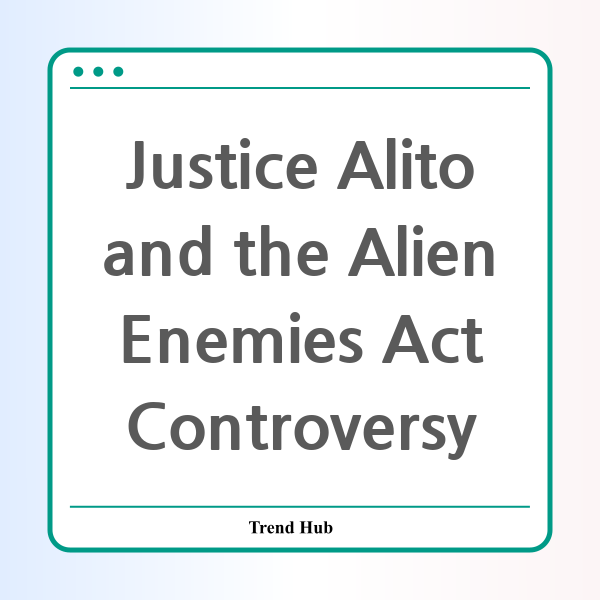* This website participates in the Amazon Affiliate Program and earns from qualifying purchases.

What happens when the past intersects with the present in the realm of law? This compelling question is at the heart of the recent Supreme Court’s engagement with the Alien Enemies Act, a law dating back to 1798, which is now being leveraged to expedite deportations of certain migrants. With Justice Samuel Alito in the mix, the stakes have never been higher. Let’s dive deeper into the implications of these legal maneuvers and what they mean for those caught in the crossfire.
Recently, the Supreme Court issued a midnight order that stirred significant debate regarding the use of the Alien Enemies Act by the current administration. This act has been cited as a tool to bypass the standard deportation processes, allowing for quicker action against immigrants deemed threatening. The complexities surrounding these proceedings have drawn the attention of civil rights groups and legal experts alike, particularly due to alleged shortcomings in how the government is implementing this law.
In the latest developments, the Court was prompted to halt deportations based on a second appeal, signaling an acknowledgment of the immediate legal ramifications that could affect a multitude of individuals. The fact that both Justices Alito and Thomas dissented prompts questions about judicial interpretations and the balance between national security and individual rights.
The nuance of the Court's decision was evident. While they allowed continued use of the act, they simultaneously mandated that migrants affected by potential deportation should receive proper notice and an opportunity to challenge their removal. However, the Court refrained from detailing how much notice should be provided, leaving a significant gap that could impact many detainees who might not understand their rights.
This scenario raises pressing concerns about fairness and transparency in the deportation process. Immigrant rights groups have raised alarms over the government’s failure to adequately inform detainees of their status and options, often providing notices that lack clarity and are only available in English. This creates a scenario where individuals might be unaware of their legal recourses, potentially leading to hasty deportations.
Justice Alito's dissent is particularly noteworthy as it reflects a critical perspective on how the Court is handling expedited cases. He criticized the midnight order, emphasizing that it was issued without giving lower courts a chance to fully consider the implications. This showcases a tension within the Court, as it navigates its role in a politically charged environment.
The ongoing litigation not only affects the individuals targeted under the Alien Enemies Act but also sets a precedent for how emergency legal decisions are made in the future. The implications are far-reaching, touching on fundamental questions about due process, executive power, and the legal rights of migrants in the United States.
As the situation unfolds, public attention is trained on both the Supreme Court's decisions and the actions of the Trump administration, which continues to assert its stance on national security threats posed by undocumented immigrants. The narrative promoted by the White House underscores a commitment to aggressive actions against criminal gangs, particularly those purportedly linked to detained Venezuelans.
In summary, the clash surrounding the Alien Enemies Act exemplifies the ongoing conflict between law and executive action, especially in times of perceived national threat. Justice Alito’s role in this dynamic should not be underestimated, as his opinions may influence how the Supreme Court navigates similar cases in the future. Stakeholders, including civil rights advocates and legal experts, must remain vigilant as this legal saga unfolds, aware that the rights of vulnerable populations hang in the balance.
Ultimately, the Supreme Court has signaled that it will continue to provide clarity as it assesses these cases, but the lack of immediate transparency poses significant challenges for those directly impacted. The discourse on immigration, legality, and human rights must evolve as this critical issue comes to the forefront of national dialogue.
* This website participates in the Amazon Affiliate Program and earns from qualifying purchases.